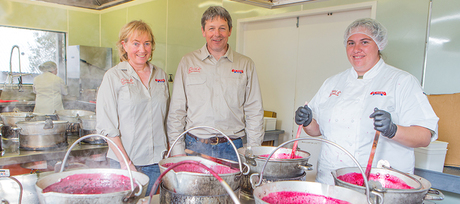Baking inventory stock controls into everyday food manufacturing operations

When starting a new food business, most entrepreneurs can answer the what, where and why questions. But many come unstuck on the how.
Small to medium-sized businesses (SMBs), especially start-ups, don’t have the cashflow to afford the kind of inventory management platforms that multinational corporations use. These enterprise resource planning (ERP) systems track everything: from inbound and outbound deliveries to the time and place of their batch production. But without any specialised software at all, SMBs cut corners — whether it’s by relying on accounting software to manage inventory or using simple spreadsheets to do the tallying manually.
These simple means of counting may work decently at the inception of a SMB. However, to maximise profit in an expanding operation, an inventory management software suite designed specifically for SMBs is an invaluable asset — particularly when it comes to cost calculations and batch tracking.
The trans-Tasman food industry is booming. Among the household brands is a dynamic legion of small food manufacturers vying for a place in a tough market. In the battle for market share, these smaller organisations have one thing on their minds: food quality. With all the attention on taste and presentation, SMBs can be deterred from the reality of costs, especially those beyond the manpower and ingredients needed to manufacture food. Components like packaging, labelling and storage can create just as much strain on the bottom line. These are often overlooked by accounting software, and manually populating spreadsheets is unproductive and error-prone.
With inventory management software, each of these elements is identified and factored into calculations. By eliminating guesswork and the potential of user input error, food manufacturers can accurately balance expenditures and introduce visibility into the business.
Complementary to predictive costing is batch tracking — the ability to track every ingredient and component involved in the creation and distribution of food items. Batch tracking provides insight into where ingredients originated, when they were collected or harvested, and when they were shipped to your facility. Too much of one component can mean wasted product and floor space. Too little signals lost sales opportunities. Both of these are detrimental to the bottom line and can potentially sink a small food manufacturer. Leveraging the powerful batch-tracking capabilities of inventory management software alleviates these issues, allowing SMBs to stock precisely the amount of food required now while accounting for seasonal sales trends to prepare for peaks and troughs in demand.
Take Te Horo Foods, for example. The New Zealand-based family business provides more than 10,000 jars of jam each week to an ever-growing market of customers. Te Horo initially used accounting software to manage its stock. However, Chris Barber, general manager at Te Horo, dreamt of increasing the company’s export market by as much as 50% in five years. With goals that bold, Te Horo needed a system that was able to handle such a large sales growth. Using inventory management software made specifically for SMBs, Te Horo expanded its operation by securing significant wins, such as providing more than 200 kg of jam to a client in China for Chinese New Year festivities.
This type of specialised software can provide for SMBs the kind of functionality that large corporations receive from enterprise resource planning systems — for a fraction of the price. Added onto an existing accounting platform, inventory management software can put the counting, tracking and managing to the backburner, keeping your product the centre of attention.
Six beverage trends predicted for 2026
Demand for customisation, 'protein-ification' and sustainable storytelling are some of...
Making UHT processing less intensive on energy
A nutritional beverages company was seeking a more sustainable way to produce UHT beverages using...
Tasty twist for chocolate alternatives
Food scientists develop two novel flavour-boosting techniques to transform carob pulp into a...








